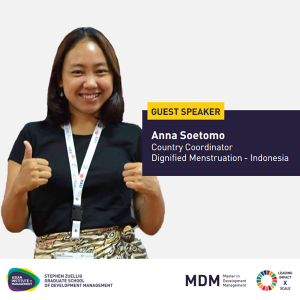Dignified Menstruation and Religion, Case Study from Indonesia
By  Anna Soetomo
Anna Soetomo
Indonesia has many terms for menstruation, namely: dapet, kotor, halangan, datang bulan, palang merah, and so on and so forth. Most terms associated with dirty and impure. Different places have different taboo, stigma, and many kind of restriction that has no benefit for menstruation. Beside tradition, this restriction also comes from religious interpretation.
Indonesia has six major world religions, some minority world religions, as well as hundreds Indigenous Religions. They have different perception and practices regarding menstruation. For example, in Hindu, they are not allowed to enter inside part of the temple during menstruation. Buddhism did not have this kind of restriction for women during menstruation. Judaism has restriction according to the text in Old Testaments, but in Christianity or Catholicism, they do not know this kind of restriction because they refer to the New Testaments. In Indigenous community, they mostly hold their tradition together with religion, so the restriction practices exist in the intertwined of both and result different practices. In some places there are no restrictions, but in other places they even have to put women in the jungle during menstruation.
Islam is the majority religion in Indonesia. But each place has its own interpretation to the sacred text according to the culture on that place. So the practice is different from one place to another. For example, some place will allow the women during menstruation to enter the Mosque as long as the blood does not pollute the floor. Some place will not allow women during menstruation enter the Mosque at all. And some other even not allow women to pass in front of the Mosque so she has to find another way to reach some places. I also have another sad story that because women can not enter cemetery during menstruation, they can not see the person they loved be buried.
The common practice based on mainstream interpretation is that women can not do the fasting during Ramadhan when they are menstruation. They are prohibited because they are at impure period. And they have to “pay” by doing fasting after the holy month. This is the mainstream argument why women can not do the holy fasting on holy month. This kind of thinking caused women positions are less than men because on the term of observance, the opportunity of women is restricted by this impure ideas. Menstruation considers as original sin because Eve eats the apple on the heaven and that is the reason why Adam and Eve were sent to the earth.
Another interpretation regarding fasting during menstruation is that a woman still could do the fasting. This interpretation based on the argument that the text says “sick” not “impure” regarding menstruation. “Sick” is a special condition when God give dispensation not to do some observance. Some people would say, “God loves women so they do not have to fast when during menstruation”. Because in this interpretation menstruation consider as sick, women who feel okay during menstruation choose to practice the fasting during holy month. In this way of thinking, women are not considers as less than men because they have similar opportunity.
While the second interpretation is not mainstreams, it makes the majority confused when women do the fasting during menstruation. There are minor debates on this but eventually it will be returned to every individual based on their faith. I think the problem is not on the practice itself but on the perception about menstruation, womanhood, and pure or impure.
In Indonesia context, especially regarding Islamic interpretation on menstruation, the opportunity for equality is already exist. Women is not less than man regarding observance and menstruation is nothing to do with original sin or impure. The homework is to mainstreaming the second interpretation – or use less misogyny interpretation – so the perception regarding menstruation could be more positive.
Dignified menstruation is a relevant movement. While we see menstruation as a perfect biological process and a part of the life-cycle itself, we can celebrate menstruation with dignity.
